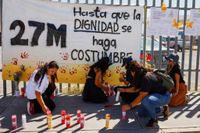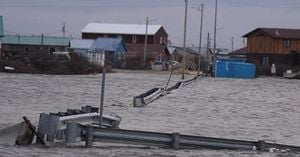On a somber Friday in Mexico City, Francisco Garduno, the country’s former immigration chief, stood before a crowd of survivors and grieving families at the Museum of Mexico City. With a heavy voice, he delivered a public apology for the catastrophic fire that tore through a migrant detention center in Ciudad Juarez back in March 2023—a tragedy that claimed 40 lives and left 27 others with lasting injuries. "I offer my deepest apologies for the suffering and harm caused to you and your families, whose lives have changed forever," Garduno said, as reported by Reuters and StratNews Global.
This moment, though highly symbolic, was not simply an act of contrition. It was the result of a contentious legal deal: in January 2025, a judge in Ciudad Juarez dismissed criminal charges against Garduno—the highest-ranking official to face indictment over the incident—in exchange for his commitment to take human rights courses and issue a public apology to the victims and their loved ones. This arrangement allowed Garduno to avoid prison time, a decision that has drawn sharp criticism from immigrant-rights organizations and families of the deceased.
The fire, which erupted on March 27, 2023, quickly became one of the deadliest migrant tragedies in Mexico’s recent memory, sending shockwaves through the country and across international borders. According to Mexican authorities and as highlighted by both Reuters and StratNews Global, the blaze began when two migrants, in a desperate act of protest against the squalid conditions of the detention center, set a mattress on fire. What followed was a harrowing sequence of failures and neglect.
Security camera footage, later circulated widely by media outlets, captured an appalling scene: guards walking away as thick, black smoke filled the center, making no move to release the migrants trapped inside. The person who held the key to the cell was nowhere to be found, a detail confirmed by former President Andres Manuel Lopez Obrador. Prosecutors, in their investigation, accused top immigration officials of failing to "watch over, protect and ensure the safety of the people and facilities in their charge," and described the case as emblematic of a "pattern of irresponsibility."
The outcry was swift and fierce, with allegations of corruption and inhumane conditions at Mexico’s migrant detention facilities gaining renewed attention. Human rights groups, already wary of the system, saw the fire as a tragic confirmation of their long-standing warnings. The incident put Mexico’s treatment of migrants under an unforgiving spotlight, raising uncomfortable questions about accountability and the state’s obligations to vulnerable populations.
In the aftermath, prosecutors moved to hold several individuals to account. While Garduno faced charges as the highest-ranking official, the legal process ultimately led to his charges being dropped in exchange for the apology and his participation in human rights education. The judge’s decision was met with dismay by many advocates. Four prominent human rights groups issued a joint statement on the day of Garduno’s apology, calling it only a "symbolic first step" toward reparation for the victims and their families. They cautioned, "The public apology should not be interpreted as an absolution of responsibility or an act of repentance. It does not resolve the demands for justice or guarantee that similar events will not be repeated."
Financial compensation was also part of the government’s response. According to both Reuters and StratNews Global, the Mexican government has paid approximately 3.5 million pesos—about $190,000 USD—to the families of each of the 40 people who died, as well as to those who were injured. While this financial support provided some relief, many survivors and relatives have emphasized that no amount of money can truly compensate for the loss and trauma suffered.
The legal reckoning, however, is not over. Prosecutors continue to pursue charges against two Venezuelan migrants accused of starting the fire, as well as ten former migration officials and private security guards who were on duty that fateful night. The ongoing prosecutions signal that the search for accountability is far from finished, even as the public apology attempts to offer a measure of closure.
The survivors’ voices, meanwhile, remain urgent and raw. Estefan Aragon, a Venezuelan migrant who lived through the fire, spoke candidly about the lasting impact on his health. "A public apology won’t restore my health," he told reporters. "We need help." Aragon suffers from serious pulmonary and breathing problems—an all-too-common legacy for many who barely escaped the smoke and flames. His words underscore the reality that, for survivors and families, the wounds of that night have yet to heal.
For immigrant-rights advocates, the fire and its aftermath have become a rallying cry for deeper reform. They argue that the tragedy was not an isolated event, but rather the result of systemic neglect and a lack of oversight within Mexico’s immigration system. The fact that guards abandoned their posts and that basic safety protocols were ignored speaks volumes, they say, about the need for comprehensive changes.
The government’s response has been closely scrutinized, both at home and abroad. While the compensation payments and public apology have been welcomed by some as steps toward recognition of the victims’ suffering, critics say these gestures fall short of true justice. They point to the continued prosecution of lower-level officials and the two Venezuelan migrants as evidence that the system is still more focused on assigning blame than on addressing the root causes of the tragedy.
At the same time, the fire has reignited debates about the broader treatment of migrants in Mexico—a country that has become a major transit point for people fleeing violence, poverty, and instability in Central and South America. With migration flows showing no sign of abating, the risks facing those in detention centers remain a pressing concern. Human rights groups warn that unless there are meaningful reforms, the conditions that led to the Ciudad Juarez fire could easily give rise to further tragedies.
As the anniversary of the fire approached, candles bearing the names of the deceased were arranged outside the detention center in Ciudad Juarez—a poignant reminder of the human cost of bureaucratic failure and indifference. For families and survivors, the pain is still fresh, and the quest for justice continues. As Garduno’s apology echoed through the hall in Mexico City, it was clear that words alone would not be enough to heal the wounds or restore trust in a system that so profoundly failed those it was meant to protect.
The scars left by the Ciudad Juarez fire serve as a stark warning: without accountability and reform, history is bound to repeat itself, and the most vulnerable will pay the highest price.




